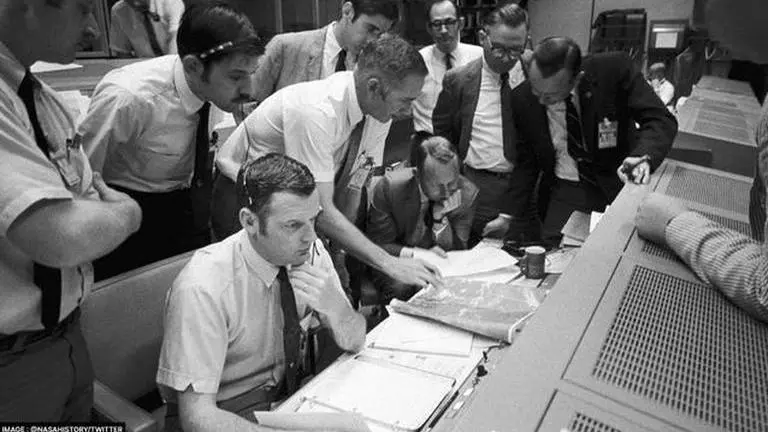Updated 14 April 2023 at 14:07 IST
'Houston, we have a problem': 53 years since these words by Apollo 13 crew made history
"Houston, we've had a problem," Lovell spoke these words on April 13 in 1970 following the rupture of a service module oxygen tank on the Apollo 13 spacecraft.
- Science News
- 5 min read

The Apollo 13 mission was launched on April 11, 1970, with the goal of landing on the Moon. It was the seventh manned mission in the Apollo program and the third mission intended to land on the Moon. The crew consisted of Commander James A. Lovell Jr., Command Module Pilot John L. Swigert Jr., and Lunar Module Pilot Fred W. Haise Jr. The mission was going smoothly until the crew heard the famous phrase "Houston, we have a problem." 53 years later, this phrase is still etched in the minds of people.
On April 13, 1970, around 56 hours into the mission, a routine procedure to stir the oxygen tanks in the Service Module of the spacecraft caused one of the tanks to explode, causing damage to both the Service Module and the Command Module. The explosion caused a loss of oxygen, power, and water, and the situation became critical for the crew.
The phrase "Houston, we have a problem" was first uttered by Jack Swigert, the Command Module Pilot, as a way of informing Mission Control of the emergency. Flight Director Gene Kranz quickly assembled a team of engineers to assess the situation and formulate a plan to bring the crew back safely to Earth.
"Houston, we've had a problem."
— NASA History Office (@NASAhistory) April 13, 2023
Jim Lovell spoke these words #OTD in 1970 following the rupture of a service module oxygen tank on the Apollo 13 spacecraft.
Watch the crew and mission control's recollections of the moment: https://t.co/6vl7v8jfoE pic.twitter.com/hfBwcuqV4L
The first priority was to power down the Command Module, which had been damaged by the explosion, and move the crew to the Lunar Module, which had its own power, oxygen, and water supply. The Lunar Module was not designed to sustain the crew for the entire journey back to Earth, but the engineers at Mission Control worked on a plan to conserve resources and extend the life of the Lunar Module.
Advertisement
Image: In this April 10, 1970 photo made available by NASA, Apollo 13 astronauts, from left, Fred Haise, Jack Swigert, and Jim Lovell gather for a photo on the day before launch.
The crew faced numerous challenges during their return journey, including issues with carbon dioxide buildup in the Lunar Module, the need to manually control the spacecraft's re-entry into Earth's atmosphere, and the risk of splashing down in a stormy ocean.
Advertisement
Image: In this April 17, 1970 file photo, crowds watch a television screen in New York's Grand Central Station waiting for the safe arrival of the Apollo 13 astronauts in the Pacific Ocean | AP
Despite these challenges, the crew of Apollo 13 was able to safely return to Earth on April 17, 1970. The mission was a remarkable demonstration of human ingenuity, courage, and teamwork. The phrase "Houston, we have a problem" has become an iconic representation of the challenges and risks of space exploration, as well as the dedication and perseverance of those who work to overcome them.
NASA's historic Apollo missions: A timeline
- Apollo 1 - Unmanned mission. Tragically, a cabin fire during a pre-launch test on January 27, 1967, killed astronauts Gus Grissom, Ed White, and Roger Chaffee.
- Apollo 7 - Manned mission. Orbital test of the Apollo spacecraft, conducted by Wally Schirra, Donn Eisele, and Walter Cunningham, in October 1968.
- Apollo 8 - Manned mission. Orbital test of the Lunar Module, conducted by Frank Borman, Jim Lovell, and Bill Anders, in December 1968. The first time humans left Earth's orbit and orbited the Moon.
- Apollo 9 - Manned mission. First test of the Lunar Module in Earth orbit, conducted by Jim McDivitt, Dave Scott, and Rusty Schweickart, in March 1969.
- Apollo 10 - Manned mission. Dress rehearsal for a Moon landing, conducted by Tom Stafford, Gene Cernan, and John Young, in May 1969. The Lunar Module descended to within 15 km of the Moon's surface.
- Apollo 11 - Manned mission. First Moon landing, conducted by Neil Armstrong and Buzz Aldrin, with Michael Collins orbiting above, in July 1969.
- Apollo 12 - Manned mission. Conducted by Pete Conrad, Alan Bean, and Dick Gordon, in November 1969. Landed on the Moon and conducted experiments.
- Apollo 13 - Manned mission. As discussed earlier, this mission did not land on the Moon due to a critical malfunction. Instead, the focus shifted to bringing the crew back safely to Earth.
- Apollo 14 - Manned mission. Conducted by Alan Shepard, Stuart Roosa, and Edgar Mitchell, in February 1971. Landed on the Moon and conducted experiments.
- Apollo 15 - Manned mission. Conducted by David Scott, Jim Irwin, and Al Worden, in July 1971. Landed on the Moon and conducted experiments, including driving a lunar rover.
- Apollo 16 - Manned mission. Conducted by John Young, Charles Duke, and Ken Mattingly, in April 1972. Landed on the Moon and conducted experiments.
- Apollo 17 - Manned mission. Conducted by Eugene Cernan, Harrison Schmitt, and Ron Evans, in December 1972. Landed on the Moon and conducted experiments, including driving a lunar rover.
Overall, six Apollo missions landed on the Moon, with the first successful landing being Apollo 11 in 1969, and the final one being Apollo 17 in 1972.
Published By : Digital Desk
Published On: 14 April 2023 at 13:25 IST


